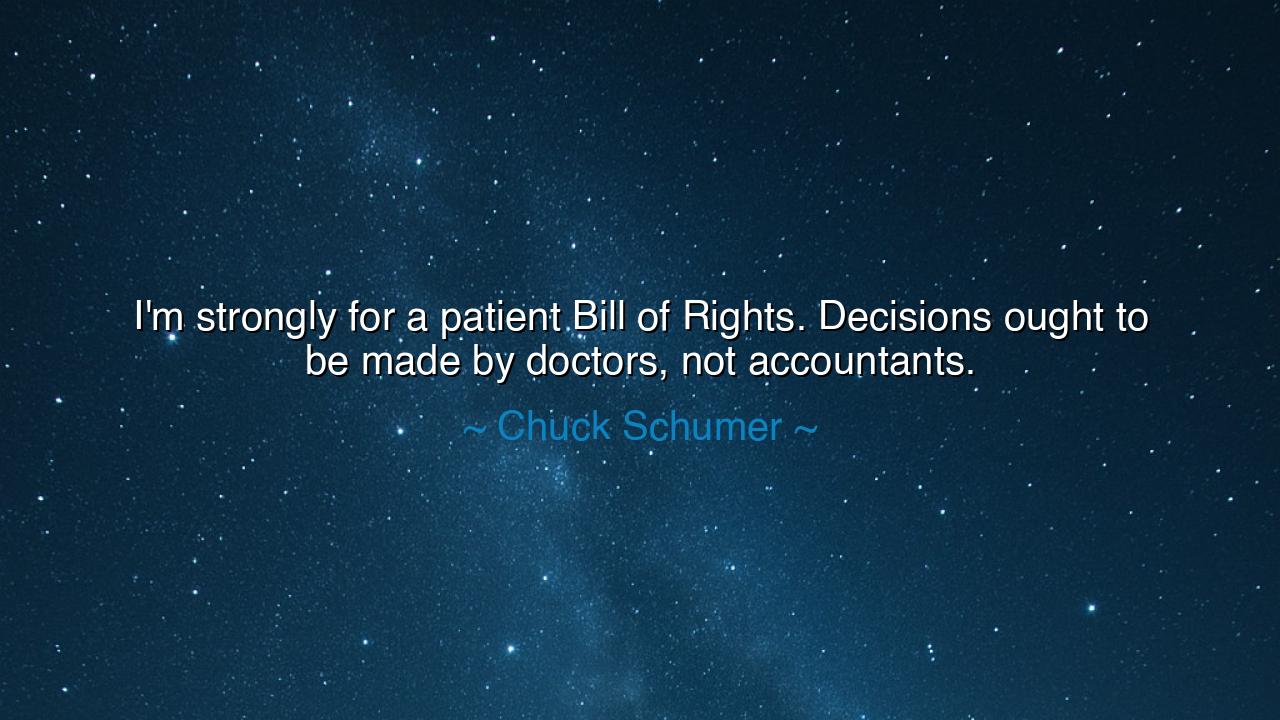
I'm strongly for a patient Bill of Rights. Decisions ought to be
I'm strongly for a patient Bill of Rights. Decisions ought to be made by doctors, not accountants.






"I'm strongly for a patient Bill of Rights. Decisions ought to be made by doctors, not accountants," says Chuck Schumer, a declaration that cuts to the heart of the relationship between care and commerce. In this statement lies an ancient truth: that the well-being of individuals should not be reduced to mere financial transactions, but should be guided by the wisdom of those who understand the body and the soul. The idea of a patient Bill of Rights is an echo of the fundamental principle that human dignity and healthcare should never be subjected to the cold, calculating logic of profit, but rather to the compassionate judgment of those who dedicate their lives to healing.
In the ancient world, the Greek physicians, such as Hippocrates, understood the importance of placing the patient's well-being at the center of medical decisions. Hippocrates, the father of medicine, established the Hippocratic Oath, which still guides medical ethics today. The central tenet of his oath is to do no harm, emphasizing that a physician’s first duty is to the patient, not to the external forces that may seek to influence their decisions. The physician was seen not just as a healer of the body, but as a guardian of trust, someone who must act with the utmost integrity and compassion. The patient’s health was never meant to be a matter for financial negotiation, but a sacred duty to be honored.
Likewise, in ancient Rome, physicians were highly respected, and their role was vital to the survival of the empire. Galen, one of Rome's most famous medical practitioners, believed that medicine was an art to be pursued with reverence, not as a mere profession for profit. His work extended beyond physical healing, touching on the moral duty of the physician. Galen understood that healing was not just about curing the body, but about serving the moral and ethical needs of the patient. He saw the physician’s role as one of trust and selflessness, ensuring that patients were treated with dignity and care, not reduced to mere numbers in a ledger.
Yet, in the modern era, there is a growing tension between healthcare and business. As Schumer points out, the involvement of accountants in the medical decision-making process has created a system where the financial considerations often overshadow the needs of the patient. This shift in focus represents a departure from the ideals of the ancients, where care was the primary concern, and the idea that human life should be measured in monetary terms was foreign. Today, in many parts of the world, the influence of the insurance industry and corporate interests has led to a system where cost-cutting is prioritized over patient welfare. These interests often create barriers to care, limiting access to life-saving treatments based on what is financially viable, rather than what is medically necessary.
A real-world example of this issue can be seen in the fight for universal healthcare. In the United States, the battle for healthcare reform has been fraught with debates over access, affordability, and the role of private insurance companies in decision-making. Stories abound of patients who, despite their doctors’ recommendations, are denied treatment due to insurance policies or the financial bottom line. This is a clear illustration of how healthcare, once a compassionate calling, has been reduced to a marketplace, where decisions are made not based on what is best for the patient, but on what is most profitable.
The lesson we must take from Schumer’s words and from the wisdom of the ancients is this: healthcare must prioritize people, not profits. A patient Bill of Rights ensures that decisions regarding one’s health are made by those who are best suited to understand the complexities of the human body—the doctors, not by those driven by financial gain. We must strive for a system that honors the dignity of the individual and provides care based on need, not cost. This is not merely an economic issue, but a moral imperative—one that calls for the preservation of humanity and the restoration of integrity in healthcare.
In our own lives, we must recognize that true healing comes when we place the well-being of others above all else, when we demand a system that serves patients, not profits. We must advocate for the rights of the vulnerable and the trust of the sick, ensuring that their voices are heard and their needs are met. Just as the ancient healers believed in the sacred bond between doctor and patient, we too must uphold the principle that the health of the people is more important than the balance sheet. In this way, we fulfill the highest calling of medicine: to heal, not just the body, but the soul of humanity itself.






AAdministratorAdministrator
Welcome, honored guests. Please leave a comment, we will respond soon